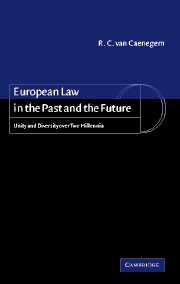Book contents
- Frontmatter
- Contents
- Preface
- 1 The national codes: A transient phase
- 2 Ius commune: The first unification of European law
- 3 Common law and civil law: Neighbours yet strangers
- 4 The holy books of the law
- 5 Why did the ius commune conquer Europe?
- 6 Law is politics
- Epilogue: A look into the twenty-first century
- Bibliography
- Index
1 - The national codes: A transient phase
Published online by Cambridge University Press: 06 August 2009
- Frontmatter
- Contents
- Preface
- 1 The national codes: A transient phase
- 2 Ius commune: The first unification of European law
- 3 Common law and civil law: Neighbours yet strangers
- 4 The holy books of the law
- 5 Why did the ius commune conquer Europe?
- 6 Law is politics
- Epilogue: A look into the twenty-first century
- Bibliography
- Index
Summary
ONE CODE FOR EVERY COUNTRY?
Present-day Europeans live under their national systems of law, which are almost invariably codified. Frenchmen live under the Code civil, Germans under the Bürgerliches Gesetzbuch and the English under their own uncodified common law. A few years ago the Dutch obtained a brand-new civil code, to replace that of 1838. European courts of justice, the European Commission, the European Parliament and European laws have not yet altered the basic fact that people live under national laws which were produced by the sovereign national states. And most people, no doubt, find this a natural state of affairs, as natural as their various languages. What they do not realize and would be surprised to find out, is that this ‘natural state of affairs’ is, on the time scale of European history, quite recent (going back only one or two centuries) and that the rise of the European Union may turn it into a brief and transient phase. That a future United Europe will strive for some degree of legal unification is plausible but, of course, uncertain. What is certain, however, is that medieval and early modern Europe managed without national legal systems. People lived either under local customs or under the two cosmopolitan, supranational systems – the law of the Church and the neo-Roman law of the universities (known as ‘the common, written laws’, or the learned ius commune).
- Type
- Chapter
- Information
- European Law in the Past and the FutureUnity and Diversity over Two Millennia, pp. 1 - 21Publisher: Cambridge University PressPrint publication year: 2001



